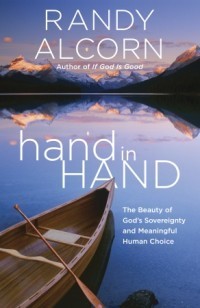Randy Alcorn's Blog, page 174
October 15, 2014
My latest book: “hand in Hand: The Beauty of God’s Sovereignty and Meaningful Human Choice”
 My new book hand in Hand was just released yesterday.
My new book hand in Hand was just released yesterday.
Why a book on this topic? Of all the questions we confront in life, none is larger and more perplexing than the question of God’s sovereignty and human choice. Are we really free to choose? Is God really free to be God?
These are vital questions not just for the theologically and philosophically oriented person, but for the average person who wonders how this all works.
Do they have to choose to believe in God’s sovereignty (“like the Calvinists”) or believe in free will (“like the Arminians”)? In fact, both schools of thought affirm both doctrines, but view them in different ways.
Does the Bible actually portray both sides of the paradox as compatible? People throughout the ages have grappled with these issues. The solution is not to shrug our shoulders and say “it’s impossible to understand,” but to explore the issue thoughtfully, then trust God that even if we can’t figure out everything, He knows, and we can trust Him.
If God is in control of the universe, and is accomplishing His ultimate plan, are people free to choose between good and evil? Does God choose to draw some people to Himself, but not others? Do people have the ability to accept or reject Him? hand in Hand is a thoughtful biblical examination of these issues.
What does it mean that God is sovereign? If He is accomplishing His will in the world, does that mean holocausts and tragedies are His will? If they are not His will, does that mean that demons, people and nature have power to thwart God? Are human beings really free, and if so, to what degree? Does the biblical teaching that people are in bondage to sin mean they’re not free to make any good choices? Can finite and fallen people still make meaningful choices for which God justly holds us responsible?
For the first ten years I knew Christ I was mostly Arminian, and now I’m mostly Calvinist. But I understand both theologies, and I don’t appreciate the way I often see both of them misrepresented. My approach is very respectful of opposing viewpoints. I quote directly from people with different perspectives rather than summarizing their viewpoint to make it a straw man that’s easily torched or dismantled. I try to fairly represent all positions, and show how each can be supported by some Scripture. I explain the need to bring all Scripture to the table, and to embrace paradox rather than rejecting one position in favor of another. My hope is that both Calvinists and Arminians (as well as those who don’t know what the terms mean or which they are) will be stretched to see what Scripture really says.
I look forward to sharing some excerpts from the book on my blog in the coming weeks. (You can also download and read the first chapter.)

P. S. Some of the material in hand in Hand was originally derived from six chapters in the middle of my book If God Is Good. However, I so substantially revised it and added so much new material, e.g. on Calvinism and Arminianism, that it is significantly altered. So it’s not just a spin-off, but a very different book that stands on its own. It also features a lot of diagrams and charts, which I hope will be helpful for readers.
October 13, 2014
Speaking Up for Christ in the Classroom
 One of the most difficult challenges for a Christian student is to be in a classroom with a professor who is openly hostile to faith in Christ. Standing up for the Lord and for righteousness in these type of situations is tough, but I believe when it is done humbly, in a spirit of grace and truth, God will bring great good out of it—most of which we will probably never see in this life.
One of the most difficult challenges for a Christian student is to be in a classroom with a professor who is openly hostile to faith in Christ. Standing up for the Lord and for righteousness in these type of situations is tough, but I believe when it is done humbly, in a spirit of grace and truth, God will bring great good out of it—most of which we will probably never see in this life.
I will never forget when I was 20, a student coming up to me after a philosophy class thanking me for speaking up for Christ when the professor was ripping apart the Christian faith. He couldn’t get over the idea that a Jesus-follower could do this, and though I lost track of him I think that it made a difference in his life, and perhaps sowed seeds in some of the unbelievers who were ultimately drawn to Christ.
Jesus said, “You will stand trial before governors and kings because you are my followers. But this will be your opportunity to tell the rulers and other unbelievers about me” (Matthew 10:18).
Our goal (whether we’re a student representing Christ in the classroom, or an adult representing Him in the workplace) shouldn’t be to cower in the corner, apologizing for our Lord and hoping no one finds out what we really believe, lest we be persecuted. If we do, our goal will be to avoid at all costs the conflict which Christ promised all who follow Him. “Indeed, all who desire to live a godly life in Christ Jesus will be persecuted…” (2 Timothy 3:12).
May we stand up for our Lord in gracious and gentle, but firm and resolute ways that refuse to allow the Creator of the Universe and Savior of Mankind to be pushed into a remote corner of a society that desperately needs to see Him as He is, and which has no hope apart from the truth He has told us to proclaim.
“If the world hates you, know that it has hated me before it hated you” (John 15:8).
“And I tell you, everyone who acknowledges me before men, the Son of Man also will acknowledge before the angels of God” (Luke 12:8).

Each blog regularly appears on my Facebook page. If you’d like to comment or see others’ comments, we invite you to join us there.
October 10, 2014
“O My Soul”: Engaging in Biblical Self-Talk
 Psychologists speak of self-talk, the art of telling yourself certain things that influence your attitude, actions and speech. For instance, Deborah said to herself, “O my soul, march on in strength!” (Judges 5:21).
Psychologists speak of self-talk, the art of telling yourself certain things that influence your attitude, actions and speech. For instance, Deborah said to herself, “O my soul, march on in strength!” (Judges 5:21).
Every time the psalmists used the phrase, “O my soul,” they were engaging in self-talk. We all talk to ourselves. Whether or not this is a good practice depends largely on what we are saying, and whether it is true and helpful.
I love these thoughts from our dear friend Joni Eareckson Tada:
There are very few days when my soul does not require a good 'talking to.' On most mornings when pain encroaches, I demand my soul to come into alignment with the Holy Spirit; I order it to stand at attention and take orders from God for the day; that it rejoice in the day that's been made by its Creator; that it ascribe to a holy purpose for living; that it quit being sullen, and be hopeful in Jesus; and that it rejoice in the Lord, for therein lies its strength! Sometimes quadriplegia is just plain tiring—add to it chronic pain, and it can wear on the soul. It's why (when I deal with pain) I often pray, "Why are you downcast , O my soul? Why so disturbed within me? Put your hope in God, for I will yet praise him, my Savior and my God" (Psalm 42:11). …join me in urging your soul to find its solace, comfort, and encouragement in Jesus Christ!
Those who, like Joni, ponder God’s Word and make it the substance of what they say to themselves will find their minds refreshed and renewed, even in the midst of difficult and trying circumstances. Feeding on God’s thoughts gives nourishment and joy. Such a well-fed and well-exercised mind will become a repository of worship, thanksgiving and praise, which will overflow into conversations, breathing in joy from our Lord, and breathing out praise to him. A life saturated in the Bible will in turn infuse others with an eternal perspective and the very happiness of God.
“Bless the LORD, O my soul; And all that is within me, bless His holy name! Bless the LORD, O my soul, and forget not all His benefits” (Psalm 103:1-2).

Each blog regularly appears on my Facebook page. If you’d like to comment or see others’ comments, we invite you to join us there.
photo credit: chunghow33 via photopin cc
October 8, 2014
The Poison of Prosperity Gospel
 Prosperity theology teaches that God will bless with material abundance and good health those who obey him and lay claim to his promises. “We don’t have to wait for God’s blessing in the life to come,” it promises. “He’ll send it to us here and now.”
Prosperity theology teaches that God will bless with material abundance and good health those who obey him and lay claim to his promises. “We don’t have to wait for God’s blessing in the life to come,” it promises. “He’ll send it to us here and now.”
This popular “name it and claim it” teaching—also called the health and wealth gospel—is not limited to certain congregations, but has worked its way into mainstream evangelical churches where it gets subtly woven into many Christians’ worldviews.
The author of Total Life Prosperity writes, “Biblical prosperity is the ability to be in control of every circumstance and situation that occurs in your life. No matter what happens, whether financial, social, physical, marital, spiritual, or emotional, this type of prosperity enables you to maintain control in every situation." (1)
The author of another book writes, “Poverty is so unnecessary. Loss is so painful.... I hate pain. Your pain can stop. I want you completely healed. That’s why I wrote this book." (2)
This false worldview breeds superficiality, seriously misrepresents the gospel, and sets people up to believe, when evil and suffering come to them, that God has been untrue to His promises.
The question isn’t whether God sometimes heals, or whether we should pray for healing. Of course He does, and of course we should. But after praying three times to be healed of a serious physical ailment, Paul trusted in God’s grace to use his suffering for His glory (2 Corinthians 12:7-10). When we make God appear to always promise short-term healing here and now, we misrepresent Him.
Tragically, the prosperity gospel has poisoned the church and undermined our ability to deal with evil and suffering. Some churches today have no place for pain. Those who say God has healed them get the microphone, while those who continue to suffer are shamed into silence or ushered out the back door.
Paul had a much different viewpoint. “It has been granted to you on behalf of Christ not only to believe in him, but to suffer for his sake” (Philippians 1:29).
“In the world you will have tribulation,” Jesus pledged (John 16:33, ESV). We should count on these promises as surely as we count on John 3:16.
The first story of the post-Fall world is Cain’s murder of Abel, a righteous man who pleased God and suffered as a direct result. Noah, Abraham, Joseph, Moses, David, Daniel, Shadrach, Meshach, Abednego, and nearly all the prophets weren’t just righteous people who happened to suffer. Rather, they suffered because they were righteous.
This continues in the New Testament, with Jesus as the prime example. Jesus said John the Baptist was the greatest of men (see Luke 7:28). Soon thereafter evildoers imprisoned then murdered John and mockingly displayed his head on a platter (see Matthew 14:6–12). What could be more utterly contradictory to the health and wealth gospel?
The Holy Spirit had hardly descended before wicked men stoned Stephen to death. Herod Agrippa beheaded James; later, Nero beheaded Paul. Tradition says Peter and Andrew were crucified; Matthew died a martyr; a lance killed Thomas; and Pharisees threw James the son of Alpheus from the temple, then stoned him and dashed his brains out with a club. First Peter is an entire book devoted to Christians suffering injustices for the sake of Christ.
Larry Waters writes, “Blessing is promised and experienced, but suffering is never eliminated. In fact, the normal life of a person who follows the Lord involves both blessing and suffering." (3)
Even at its best, the ancient world offered a hard life. Christians routinely suffered. They still do. Even Christians who don’t suffer persecution still pull weeds, experience pain in childbirth, become ill and die, just like everyone else.
The health and wealth gospel’s claims are so obviously opposed to countless biblical passages that it is difficult to imagine, apart from the deceptive powers of Satan, how so many Christians could actually believe them.
Peter wrote, “Dear friends, do not be surprised at the painful trial you are suffering, as though something strange were happening to you. But rejoice that you participate in the sufferings of Christ, so that you may be overjoyed when his glory is revealed” (1 Peter 4:12–13).
Suffering—whether from persecution, accidents, or illnesses—shouldn’t surprise us. God has promised it. One of the great tragedies about the health and wealth gospel is that it makes God seem like a liar. When people believe that God promises to keep them from suffering, God appears untrustworthy when suffering comes.
When hard times come, people should lose their faith in false doctrine, not in God. In contrast to jewelry-flaunting televangelists, Paul said, “We must go through many hardships to enter the kingdom of God” (Acts 14:22).
If you are a Christian, God will deliver you from eternal suffering. And even now He will give you joyful foretastes of living in His presence. That’s His promise.
Check out this great animated video with strong words full of truth from John Piper about the prosperity gospel:

Each blog regularly appears on my Facebook page. If you’d like to comment or see others’ comments, we invite you to join us there.
Endnotes
1 Creflo A. Dollar Jr., Total Life Prosperity (Nashville, TN: Thomas Nelson, 1999), x.
2 Mike Murdock, 7 Keys to 1000 Times More (Dallas: Wisdom International, 1998), 13.
3 Larry J. Waters, “Missio Dei in the Book of Job,” Bibliotheca Sacra 166, no. 661 (January–March 2009): 32.
Photo credit: hberends via sxc.hu
October 6, 2014
Turning Bad into Best
 In Romans 8:28 Paul wrote, “We know that God works all things together for good to those who love him.” This verse tells us what we will one day see in retrospect.
In Romans 8:28 Paul wrote, “We know that God works all things together for good to those who love him.” This verse tells us what we will one day see in retrospect.
C. S. Lewis, in The Great Divorce, wrote that “both good and evil, when they are full grown, become retrospective… Heaven, once attained, will work backwards and turn even that agony into a glory.”
The Curse will be reversed. Lewis has Aslan explain the deeper magic the witch didn’t know about when he died for a sinner: “the Table would crack and Death itself would start working backward.”
Retrospect enables us to see everything differently. It’s why we can call the worst day in all of history “Good Friday.”
Faith is like a forward memory, allowing us to believe as if what is promised has already happened. One day we will see how Romans 8:28 was true all along, even in those moments we most doubted it. Joseph saw this in Genesis 50:20, the Romans 8:28 of the Old Testament: “You intended it for evil but God intended it for good.” (Notice Joseph didn’t merely say, “God made the best of bad circumstances.”)
Here’s a question: how long will it take living with God on the New Earth before you say, “At last, all that suffering has been worth it”? Five seconds? Five minutes? Five years? Maybe you’re a pessimist and you think, “It would take 500 years before it would be worth it!” Well, fine, Eeyore, or perhaps I should say Puddleglum; after 500 years you’ll have an eternity of unending, God-centered happiness in front of you, paid for by the shed blood of God. Can you think of anything better?
There is only one answer bigger than the question of evil and suffering: JESUS. Do you ever think, I would never do to my child what God has done to me! He must not care”? Picture Jesus stretching his nail-scarred hands toward you, and asking, “Do these look like the hands of a God who does not care?” God’s Son, by taking upon himself our sins, suffered far more than any person in history.
If God decided all the suffering of history is worth the price paid, who are we to say otherwise? He knows everything, and took upon himself the lion’s share of human suffering. Hasn’t he earned the right to be trusted?
Take some time to list the worst things that have ever happened to you, then list the best things. You’ll be astonished by how many of those best things came out of the worst things. Trust God to do the same with things that don’t yet make sense. In the hands of a God of sovereign grace, our sufferings will give birth to future happiness beyond our wildest dreams. Jesus said our sorrows will turn into joy—not just be followed by joy, but transformed into joy! (John 16:20). Think of it…for God’s children, what is now pain will ultimately be transfigured into both glory and joy.

This blog is excerpted from Randy’s contribution to The Romantic Rationalist: God, Life, and Imagination in the Work of C. S. Lewis (Edited by John Piper, David Mathis; Contributions by Randy Alcorn, Philip Graham Ryken, Kevin J. Vanhoozer, Douglas Wilson).
Available from EPM for $12.99 (retail $17.99)
photo credit: Harold Laudeus via photopin cc
October 3, 2014
Praising God with Music, and a Powerful A Cappella Video
 I love the transcendence of great music, a gift from our Creator who is, no surprise, creative! The Bible is full of examples of people praising God with singing and musical instruments. In the Temple—a representation of God’s presence—288 people sang and played a variety of instruments (1 Chronicles 25:1-8). The psalmist instructed the people to praise God with trumpets, harps, lyres, tambourines, strings, flutes, and cymbals (Psalm 150).
I love the transcendence of great music, a gift from our Creator who is, no surprise, creative! The Bible is full of examples of people praising God with singing and musical instruments. In the Temple—a representation of God’s presence—288 people sang and played a variety of instruments (1 Chronicles 25:1-8). The psalmist instructed the people to praise God with trumpets, harps, lyres, tambourines, strings, flutes, and cymbals (Psalm 150).
Hezekiah said, “We will sing with stringed instruments all the days of our lives in the temple of the Lord” (Isaiah 38:20). Jesus sang with His disciples (Mark 14:26), and the apostle Paul instructed Christians to sing to the Lord (Ephesians 5:19). James says, “Those who have reason to be thankful should continually sing praises to the Lord” (James 5:13, NLT).
Our dear friend Diane Meyer posted this A Cappella video, “I Need Thee Every Hour.” Wow. Listen to it, let it move your heart and stir your soul as it did mine. May we affirm our constant need for our Savior. I encourage you to take a few minutes to praise God, the Creator of music and Redeemer of His beloved children:
“I will sing to the Lord all my life; I will sing praise to my God as long as I live” (Psalm 104:33).

Each blog regularly appears on my Facebook page. If you’d like to comment or see others’ comments, we invite you to join us there.
October 1, 2014
Why You Can Live Free from the Burden of YOLO, “You Only Live Once”
 Many people believe this life is all there is. Their philosophy? “You only go around once on this earth, so grab for whatever you can.”
Many people believe this life is all there is. Their philosophy? “You only go around once on this earth, so grab for whatever you can.”
If you’re a child of God, you do not just “go around once” on Earth. You don’t get just one earthly life. You get another—one far better and without end. You’ll inhabit the New Earth! You’ll live with the God you cherish and the people you love as an undying person on an undying Earth. Those who reject God and go to Hell are the ones who go around only once on this earth.
Consider the expression YOLO: “you only live once.” It rightly recognizes you will die, but assumes that you will never live again after you die. The Good News is radically different. Christ’s promise is not YOLO, but that those who believe in Him will not perish but have everlasting life (John 3:16). The gospel has power that not only affects this life, but transcends it.
We use the term eternal life without thinking what it means. Life is an earthly existence in which we work, rest, play, and relate to each other in ways that include the cultivation and enjoyment of culture. Yet we have redefined eternal life to mean an off-Earth existence stripped of the defining properties of what we know life to be. Eternal life will be enjoying forever what life on Earth is at its finest moments, what it was intended to be. Since in Heaven we’ll finally experience life at its best, it would be more accurate to call our present existence the beforelife rather than what follows the afterlife.
The best is yet to come. We do not pass our peak in this life! Missed opportunities will be replaced by billions of new and better opportunities—all by God’s grace, and many granted us by God as rewards for our faithfulness now (He owes us nothing, but delights in rewarding his children for serving him). Don’t wait until you die to believe it! Believing it will change your life now. It will change how you think, how you view the people around you, and what you do with your time and money, which are really God’s.
God promises us eternal life as totally healthy, embodied people more capable of worship, friendship, love, discovery, work, play and relaxation than we have ever been.
I am convinced that the typical view of Heaven—eternity in a disembodied state—is not only completely contrary to the Bible but hides from our imaginations the far greater truth of Scripture, the far richer eternal destiny of redeemed life, relationships, culture and physical activity on the New Earth.
This is not our only chance at life on Earth. The doctrine of the New Earth clearly demonstrates that.
The promise of eternal life as resurrected people on the New Earth frees us from the fear that we’ll somehow miss out on enjoying experiences if we don’t experience them here and now. But an eternal perspective also helps us avoid wasting this present life God has given us.
The Apostle Peter writes, “Since all these things are thus to be dissolved, what sort of people ought you to be in lives of holiness and godliness, waiting for and hastening the coming of the day of God, because of which the heavens will be set on fire and dissolved, and the heavenly bodies will melt as they burn! But according to his promise we are waiting for new heavens and a new earth in which righteousness dwells” (2 Peter 3:11-13).
Just as nonchristians won’t have a second chance to go back and this time accept Christ, so we as Christians won’t have a second chance to go back and this time serve Him. Today may be our last opportunity to represent Christ to our neighbors and to the needy.
As missionary C.T. Studd put it, “Only one life, ‘twill soon be past, only what’s done for Christ will last.”
Five minutes after we die we’ll know exactly how we should have lived. But then it will be too late to go back and change anything. God has given us his Word so we don’t have to wait until we die to know how we should have lived.
Let’s remember that we don’t just live once. But let’s also remember that we have a brief time to make an eternal impact in this fallen world for Christ… and all eternity to enjoy life in the presence of our King.

Each blog regularly appears on my Facebook page. If you’d like to comment or see others’ comments, we invite you to join us there.
photo credit: Lauren Paulsen via photopin cc
September 29, 2014
Six Reasons to Live More Simply—and Give More Generously
 Someone has said, “Live simply that others may simply live.” Of course, there is no automatic relationship between my simple living and someone else being rescued from starvation or reached with the gospel. There is only a relationship if I, in fact, use the resources I have freed up to feed the hungry and reach the lost. This itself assumes I will continue to make a decent wage. For if I go off and pursue simple living for simple living’s sake, spending what little I earn on myself, it does no good for anyone else. The point is not merely saying “no” to money and things, but using money and things to say “yes” to God.
Someone has said, “Live simply that others may simply live.” Of course, there is no automatic relationship between my simple living and someone else being rescued from starvation or reached with the gospel. There is only a relationship if I, in fact, use the resources I have freed up to feed the hungry and reach the lost. This itself assumes I will continue to make a decent wage. For if I go off and pursue simple living for simple living’s sake, spending what little I earn on myself, it does no good for anyone else. The point is not merely saying “no” to money and things, but using money and things to say “yes” to God.
How can we live more simply? There are thousands of ways. We can buy used cars rather than new, modest houses rather than expensive ones. We don’t have to replace older furniture just for appearances. We can mend and wear clothes we already have, shop at thrift stores, give up recreational shopping and costly clothes and jewelry, cut down on expensive convenience foods, and choose less costly exercise and recreation. Some of us can carpool, use public transportation, or a bike instead of a car or second car. But these are things few of us will do unless we have clear and compelling reasons. Here are six:
1. We should live more simply—and give more generously—because Heaven is our home.
The single greatest deterrent to giving—and to living more simply—is the illusion that this world is our home.
Suppose your home were in France and you were visiting the United States for eighty days, living in a hotel. Furthermore, suppose there’s a rule that says you can’t take anything back to France on your flight home, nor can you ship anything or carry back money with you. But while you’re in America, you can earn money and send deposits to your bank in France. Question: Would you fill your hotel room with expensive furnishings and extravagant wall hangings? Of course not. Why? Because your time in America is so short, and you know you can’t take it with you. It’s just a hotel room! If you’re wise, you’ll send your treasures home, knowing they’ll be waiting for you when you arrive.
We’re here on earth on a short-term visa. It’s about to expire! Don’t spend too much time and money and energy on your hotel room when instead you can send it on ahead.
2. We should live more simply—and give more generously—because it frees us up and shifts our center of gravity.
Copernicus sparked a revolution when he proved that the sun doesn’t revolve around the earth. Giving will spark a Copernican revolution in the lives of Christians who understand that life doesn’t revolve around the things of earth. In giving, we surrender our possessions to their proper center of gravity: God. Life no longer revolves around houses and land and cars and things. Giving—and the simpler living that results when we give—breaks us out of Money’s orbit and sets up for us a new center of gravity, in Heaven.
3. We should live more simply—and give more generously—because we’re God’s pipeline.
Christians are God’s delivery people through which he does his giving to a needy world. We are conduits of God’s grace to others. If we forget that we’re God’s stewards—his delivery drivers—it’s like FedEx or UPS forgetting that what they carry in their trucks doesn’t belong to them. When that happens, deliveries grind to a halt and people don’t get what they need.
God comes right out and tells us why He gives us more money than we need. It’s not so we can find more ways to indulge ourselves and spoil our children. It’s not so we can insulate ourselves from needing God’s provision. It’s so we can give and give generously (2 Corinthians 8:14;9:11).
4. We should live more simply—and give more generously—because of the reward we’ll receive in Heaven and the joy it will bring us.
If I choose a smaller house here on earth and invest the savings in God’s kingdom, God will give me eternal treasures in Heaven that will make a big house on earth seem utterly trivial. Why settle for an expensive necklace now when by selling it and giving the money to meet needs it could contribute to an imperishable treasure in eternity?
5. We should live more simply—and give more generously—because of the dire spiritual needs of the world.
Suppose God wanted to reach the world for Christ and help an unprecedented number of suffering people. What might you expect Him to put in the hands of His delivery people? Unprecedented wealth to meet all those needs and reach all those people? Well, He’s done it, hasn’t He? The question is, what are we doing with it?
John Piper makes this observation:
Three billion people today are outside Jesus Christ. Two-thirds of them have no viable Christian witness in their culture. If they are to hear—and Christ commands that they hear—then cross-cultural missionaries will have to be sent and paid for. All the wealth needed to send this new army of good news ambassadors is already in the church. If we, like Paul, are content with the simple necessities of life, hundreds of millions of dollars in the church would be released to take the gospel to the frontiers. The revolution of joy and freedom it would cause at home would be the best local witness imaginable.
6. We should live more simply—and give more generously—because of the world’s urgent physical needs.
“[Agabus] stood up and through the Spirit predicted that a severe famine would spread over the entire Roman world. (This happened during the reign of Claudius.) The disciples, each according to his ability, decided to provide help for the brothers living in Judea. This they did, sending their gift to the elders by Barnabas and Saul” (Acts11:28-30).
Here is the biblical pattern for giving: See a need, give to meet it. Giving according to our ability means living on less than God has entrusted to us. If He has entrusted us with a great deal, as He has most people reading this, it means living on far less so we can deliver the excess to the needy. That way they will not have too little and we will not have too much—exactly what God intends, according to 2 Corinthians 8:14.

Each blog regularly appears on my Facebook page. If you’d like to comment or see others’ comments, we invite you to join us there.
photo credit: David Robert Wright via photopin cc
September 26, 2014
Surf Like a Pig
 Scripture says a great deal about animals, portraying them as Earth’s second most important inhabitants. God entrusted animals to us, and our relationships with animals are a significant part of our lives.
Scripture says a great deal about animals, portraying them as Earth’s second most important inhabitants. God entrusted animals to us, and our relationships with animals are a significant part of our lives.
Most people you meet are partial to dogs or cats. Some, as in the case of the man in this video, are even partial to pigs. I showed this unusual video to my grandsons, and they loved it:

Each blog regularly appears on my Facebook page. If you’d like to comment or see others’ comments, we invite you to join us there.
September 24, 2014
Why Talking about Mortality with Your Loved Ones Isn’t Morbid, but a Gift
Years ago when my children were still at home, before leaving on trips, sometimes I said to them, “I’m not expecting anything to happen, but remember, if it does, I’ll see you again in Heaven.”
Some would consider this morbid or inappropriate. But why? Mortality is a fact of life. What do we gain—and what do our children gain—if we pretend it isn’t? I’m going to die. So are you. So are our children. We don’t know when, but we do know it will happen—unless, of course, Christ returns in our lifetime. He will return, but throughout the centuries He hasn’t yet, even though countless people believed that He would return before they died.
 How many children—whether ten years old or forty—have been traumatized by the sudden loss of a parent? When Dad and Mom speak openly of this possibility, it’s a gift to their children. If Christian parents remind their Christian children that the worst that can happen in death is temporary separation, it’s reassuring. Their relationship cannot be terminated, only interrupted. What will eventually follow—whether in hours, days, years, or decades—is a great reunion, wonderful beyond imagination.
How many children—whether ten years old or forty—have been traumatized by the sudden loss of a parent? When Dad and Mom speak openly of this possibility, it’s a gift to their children. If Christian parents remind their Christian children that the worst that can happen in death is temporary separation, it’s reassuring. Their relationship cannot be terminated, only interrupted. What will eventually follow—whether in hours, days, years, or decades—is a great reunion, wonderful beyond imagination.
Ancient merchants often wrote the words memento mori—“think of death” —in large letters on the first page of their accounting books. Philip of Macedon, father of Alexander the Great, commissioned a servant to stand in his presence each day and say, “Philip, you will die.” In contrast, France’s Louis XIV decreed that the word death not be uttered in his presence. Most of us are more like Louis than Philip, denying death and avoiding the thought of it except when it’s forced upon us. We live under the fear of death.
Jesus came to deliver us from the fear of death, “so that by his death he might destroy him who holds the power of death—that is, the devil—and free those who all their lives were held in slavery by their fear of death” (Hebrews 2:14-15).
In light of the coming resurrection of the dead, the apostle Paul asks, “Where, O death, is your victory? Where, O death, is your sting?” (1 Corinthians 15:55).
What delivers us from the fear of death? What takes away death’s sting? Only a relationship with the Person who died on our behalf, the One who has gone ahead to make a place for us to live with Him.
It’s neither morbid nor inappropriate to speak of such things with your family. Denial of truth, not truth itself, is the breeding ground for anxiety. One of the greatest gifts you can bestow on your loved ones is the honest anticipation of reunion in the better world, the one for which we were made.

Each blog regularly appears on my Facebook page. If you’d like to comment or see others’ comments, we invite you to join us there.



